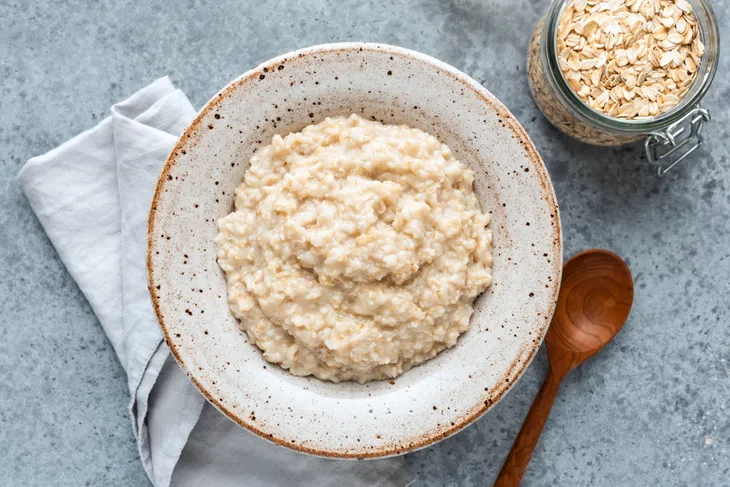- Some foods and drinks like potato chips, red meat, coffee, and acidic juices can irritate the throat.
- Other foods can help soothe the throat such as soup, smoothies, ice cream, and bananas.
- If your sore throat is severe or lasts longer than 1-week, you should make an appointment with your doctor.
Almost everyone can relate to having a sore throat at some point or another, probably multiple times in their lifetime. However, there are many things that can be the root cause of a sore throat, so don’t jump to any dire conclusions.
No matter what the cause is, did you know there are some foods that can make your sore throat last longer or be more intense, while others can naturally soothe it? Well, you will now! We’re going to detail a number of foods that you’ll want to leave behind (or adopt) until your throat is healed — or beyond.
Eat: Chicken Soup for the Soul (And Throat)
It’s hard to top a nice bowl of chicken soup, especially during a long, cold winter. If you have a sore throat, then there are even more incentives to dip your spoon into a homemade chicken soup, according to Medical News Today.
The source cites past research that suggests the vegetable content of chicken soup may have “anti-inflammatory properties and help clear the airways,” which is obviously good news to a sore throat sufferer. Meanwhile, the source points out that simple bone broth may also help to reduce inflammation.
Eat: Don’t Fear Other Dairy Products
Healthline says that some other dairy products, such as milk and plain yogurt, can also be good things for bad throats. That’s because they’re easy to swallow, and the soft texture won’t irritate your throat on the way down, notes the source.
This is contrary to the popular belief that milk products can make a sore throat worse from increased phlegm production. The Mayo Clinic says the “science doesn’t back up the belief” that milk and phlegm are related. In fact, it says a fruit and yogurt smoothie provides zinc, calcium, and more that can benefit you.
Eat: Go Bananas on Bananas
Medical News Today explains that the banana, sometimes called the “perfect food,” can be a hero for your sore throat. That’s mainly because they’re soft and easy to swallow, and are packed with good stuff for your body. They’re also non-acidic.
Harvard School of Public Health provides a list of this good stuff in bananas, including Vitamin B6, potassium, magnesium, vitamin C, manganese, and fiber. Bananas also have a low glycemic index, says the source, meaning they’re not likely to spike your blood sugar.
Switch It Up: Reconsider Your Breakfast Choices
Livestrong explains that coarse foods (aside from the fried variety) can lead to a worsened sore throat. It says that granola and toast (commonly eaten in the morning or during brunch) can “scratch” your throat, which will likely not improve your condition.
The source says to instead reach for “easy to swallow” substitutes for sustenance including eggs, cooked cereals (and warm oatmeal), smoothies, and yogurt.
Switch It Up: Swap Coffee for Tea
Medical News Today said a good old-fashioned cup o’ tea might be what’s needed to soothe your achy throat, thanks in part to its warmth. It cites a study that shows green tea, in particular, can ease a throat following surgery. The source also says green tea is natural and boasts anti-inflammatory properties.
Meanwhile, Livestrong explains that while coffee is not the worst thing for you in the case of dreaded strep throat, there are downsides to drinking coffee when you’re feeling sick. More specifically, it says the high average caffeine content of coffee can keep you up when you need rest. It can also trigger headaches, it says, which will make the whole situation worse.
Avoid: Ditch the Potato Chips
There are several dry snack foods to avoid during a sore throat listed by Healthline. For example, there are potato chips, pretzels, and popcorn (the latter may not technically be “dry” if you’ve slathered butter all over it, but we’re still going with it).
The reason to avoid these (and some other listed products like crackers, which can have sharp corners) is that it could lead to more mucus production, or make your mucus thicker, says the source. “This may prompt you to clear your throat more often, which may aggravate your sore throat,” it notes.
Avoid: Put Red Meat on Hold
According to Livestrong, red meat can be an aggravator when it comes to a sore throat situation. The main reason, it says, is because red meat is considered “high-fat,” and therefore harder for your body to process. The result is that the extra work to digest can suppress your immune system.
Once that happens, symptoms of a cold such as a sore throat may worsen, the source explains. Instead of throwing a steak in the oven, you can choose leaner meats such as chicken and fish. There could be other health benefits of cutting certain meats for the long term, such as a lowered risk of colon cancer.
Avoid: Go Easy on the Juice
Sure, many juices contain essential vitamins and nutrients, and generally aren’t an issue in moderation. However, remember that many fruit juices contain vitamin C from citrus sources. According to Medical News Today, that makes them acidic.
The site warns that acidity can “irritate the already tender surface of the throat.” And while your go-to remedy for a sore throat or cold might be to load up on vitamin C, the source points out there’s no research that actually confirms its effectiveness for this purpose. However, it’s worth noting, Medical News Today says pomegranate juice may actually be good for your sore throat.
Avoid: Un-Spice Your Life
Okay, no, we’re not actually saying you can’t have a fun life and a sore throat at the same time, but maybe you could take it easy on the extracurricular activities for a bit. Also, if you’re a lover of spicy foods, then you’ll also want to reconsider them before your next meal.
According to Insider, having a sore throat is an indicator you should hold off on the spiciness for a while (or longer if a doctor says so). “Eating spicy foods can cause your vocal cords to inflame, leaving you with a hoarse voice,” explains the source. It can also trigger acid reflux that can worsen your throat.
Avoid: Go Easy on the Fried Chicken and Fries
We know your eyes got wider and your tummy rumbled when you read this headline. There’s no doubt that some fried foods are delicious, but a lot of them can become a health problem. In fact, fried foods can worsen your mood, and can also flare symptoms of COPD.
Livestrong lumps deep-fried foods in the “fatty” category, and as previously explained, this can dampen your immune system. The source adds that the often “dry and rough” breading on many fried foods can lead to further irritation of the throat.
When to Call a Doctor
Eating the right foods to ease your sore throat can be helpful, but it’s not a medical solution. The Mayo Clinic says that adults who have a sore throat that is “severe” or lasts longer than 1-week should make an appointment with their doctor.
Other signs that you should visit a physician sooner rather than later include difficulty swallowing (this could present as excessive drooling in a child), trouble breathing, an earache, rash, a high fever, or a lump in the neck. Also, be wary of accompanying joint pain or blood in the saliva, the source adds.














